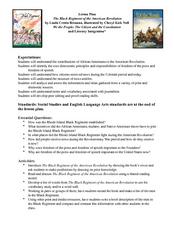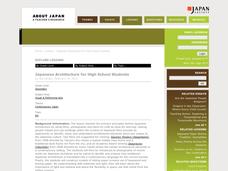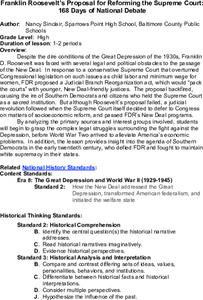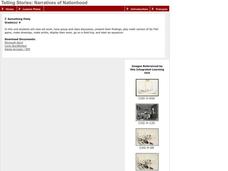PBS
Button, Button
Youngsters count, classify, and estimate quantities using buttons after a read aloud of The Button Box by Margarette S. Reid. They discuss the difference between guessing and estimating. Based on an experiment, they predict the...
Curated OER
Understanding Dialect as Used by Mark Twain
A reading of Mark Twain’s The Celebrated Jumping Frog of Calaveras County not only offers pupils an opportunity to practice their listening skills but also provides them with examples of dialectic speech. This is the gol’derndest lesson...
Curated OER
Burlap Weaving Gone Wild
Explore art using fabric with this resource. Learners talk about weaving and create art work after discussing this important technique. This is a great way integrate art and history.
Levin Institute
Unit on Culture and Globalization
Students explore the concept of cultural globalization. In this global issues lesson, students read and discuss the linked Web articles about world cultural issues and the dominance of the American market.
Curated OER
Editing Marks, Part 1
Dander from the show Twisted Whiskers and characters from My Little Pony are featured in this three part lesson that explores using story pyramids to scaffold ideas, adding sensory details to enrich writing, and editing using common...
Curated OER
We the People: The Citizen and the Constitution: The American Revolution
The contributions of African-Americans to the American Revolution are the focus of this Social Studies and language arts instructional activity. After reading and discussing Linda Crotta Brennan’s The Black Regiment of the American...
Japan Society
Japanese Architecture for High School Students
Japanese architecture is rich in symbolism and culture. Critical thinkers engage in three activities intended to expose them to the beauty of Japan. They read through the book, Praise of Shadows by Junichiro Tanizaki and watch the...
Hawaiʻi State Department of Education
Angles on Kandinsky
Not only is Wassily Kandinsky fun to say, his art contains tons of angles. Learners discuss Kandinsky's music-inspired abstract art and four types of angles. They search one of his paintings for obtuse, right, straight, and acute angles,...
Digital Forsyth
Parts of a Whole
High school artists create a collaborative piece based on a historical image. Each member of the class is given two days to draw one part of the whole image, when the two days are up; they put their pieces together and discuss the...
Baylor College
What's Is Soil Made Of?
It's time to roll up those sleeves and get a little dirty in the second lesson plan of this series on the science of food. Investigate where plants and animals get the minerals they need to live in this two-part exploration of soil....
Baylor College
Using Food Labels
Help your class make sense of nutrition labels with the ninth activity of this series. After explaining the different information provided on packaged food labels, perform an activity that demonstrates the amount of sugar in a single can...
Baylor College
Fungus Among Us
In order to learn that mold spores can be found in the air, observers grow bread mold and make observations for a few days. Afterward, they participate in a class discussion to arrive at the knowledge that bread spores are present in the...
Clarkson University
Forms, States, and Conversions
Searching for a way to integrate multiple concepts of energy conversion while captivating a middle school audience? This lesson presents topics related to potential and kinetic energy and offers the ability to allow...
National History Day
Challenging the Status Quo: Women in the World War I Military
Why are some so resistant to change? The status quo is often to blame for a lack of forward movement in society. Following the events of World War I, women in America suddenly had a voice—and were going to use it. Scholars use the...
Center for History Education
Franklin Roosevelt's Proposal for Reforming the Supreme Court: 168 Days of National Debate
Was it overreach or wise executive functioning? Scholars have long debated Franklin Roosevelt's court-packing scheme when he attempted to stack the court with justices friendlier to his New Deal measures. Now, learners pick up the...
Curated OER
Dinosaur and DNA Days
Biology stars extract DNA samples from beef thymus and then examine its properties. They use enzymes to digest the DNA samples, and then use electrophoresis to separate fragments. Finally, they discuss methods and principles of...
Curated OER
Let Me Tell You About My State
State reports can be a lot of fun, especially when the learners get to choose the state they study. This research and writing-focused social studies lesson engages learners in collecting information, essay structure, research, and...
Curated OER
Ten Sly Piranhas: Subtraction with Goldfish Crackers
Class members listen to the William Wise book Ten Sly Piranhas and act out the story with one child playing the piranha. They use goldfish crackers (eating them to show subtraction) to demonstrate and understand equations they see...
Curated OER
Community and Me
First and second graders view art work, have group and class discussions, listen to stories, write themes, make notes, conduct interviews, graph results, chart findings, and plan a career day. These ambitious lessons should lead your...
Curated OER
Once Upon a Time
Young artists view pieces of artwork by Robert Harris, then have class discussions, write collaborative stories, make a painting or drawing, and analyze and create their own advertisements. This series of lessons should lead to some...
Curated OER
Strange Encounters
Learners explore the world of mystery! A series of lessons use the images of artist Robert Harris. They engage in story telling, song writing, movement, and art. Next, they create a class book of mysterious stories and images, and they...
Curated OER
To Every Thing There is a Season......
A wonderful series of lessons on the four seasons. Everyone explores the seasons through looking at proper clothes, monitoring temperatures, looking at paintings of each of the seasons, and creating their own images with their...
Curated OER
Something Fishy
Fourth graders complete a variety of activities which are related to fish, and the history of the fishing industry in Canada. This series of lessons incorporates artwork, math, whole-class games, and the construction of an in-class...
Curated OER
Scary Stuff
Fourth graders interview community members for a newspaper, design a business brochure, write a disappearing ghost story, and try their hands at monoprinting. This series of three lessons combines art, journalism, and creative writing....

























